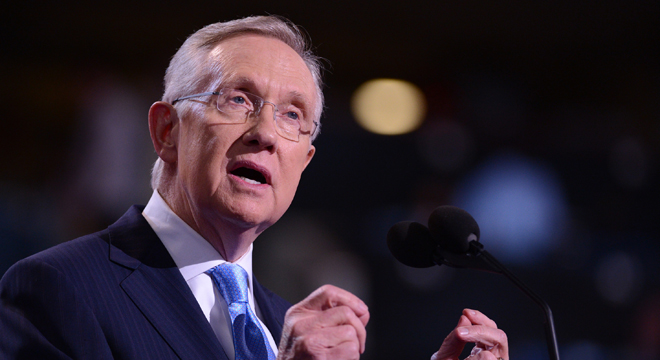Democratic leaders, frustrated by the GOP’s unwillingness to reckon with the need to raise taxes, are publicly airing the hard-bargaining demands they’re bringing to budget negotiations with Republicans.
The Senate’s top two Democrats, in separate remarks Tuesday, each said that Congress could avoid looming across-the-board tax increases and spending cuts if House Republicans agree to freeze all the Bush tax rates except those benefitting top earners. If that were accompanied by an increase in the debt limit, and the creation of a separate track for reforming the tax code and social safety net programs in 2013, the near-term austerity problem will be solved, and lawmakers can call it a day.
In other words, Senate Democrats are staking out the position that entitlement reform should not be on the table in fiscal cliff negotiations.
“If we fail to reach an agreement, the average middle-class family will see their taxes go up by $2,200 a year,” said Senate Majority Leader Harry Reid (D-NV) told reporters at his weekly press availability. “As I’ve indicated, the Senate has already reacted to stop that and the House is one vote away from making that a reality for many millions of Americans who are middle class.”
Reid and other leading Democrats have been pressing Republicans to allow the Bush tax cuts for top earners to expire for months. But their push takes on new meaning as they warn that budget negotiations have slowed and the scheduled austerity measures might take effect in full just one month from now.
Sen. Dick Durbin (D-IL), the Democratic whip, sang a similar tune in remarks across town Tuesday at the Center for American Progress, a liberal DC think tank. Like Reid, Durbin said that Congress should agree to a framework that includes the expiration of the top end tax cuts, raises the debt limit, and creates a pathway toward tackling bigger issues like overhauling the tax code and reducing spending on entitlement programs next year.
“Progressives should be willing to talk about ways to ensure the long-term viability of Social Security, Medicare and Medicaid, but those conversations should not be part of a plan to avert the fiscal cliff,” Durbin said in prepared remarks.
A Durbin spokesman clarified the broad intent of these remarks. “We’ve cut 1.5 [trillion dollars] and shouldn’t cut further to avoid the cliff. Pass the Senate tax bill, create a framework for long-term deficit reduction talks (i.e. tax reform) and get past the cliff. Then we can and should entertain changes to entitlements that protects beneficiaries, but extends the future of these programs. We can make small changes that pay big dividends over the long term.”
Reid argued that with over a trillion dollars in spending cuts from last year’s debt limit deal in the bank, the immediate focus should be on Obama’s revenue target, and questions about Medicare, Medicaid and Social Security can be dealt with down the line.
“[W]e hope that they can agree to the tax revenue that we’re talking about, and that is rate increases, and as the President’s said on a number of occasions, we’ll be happy to deal with entitlements,” Reid said.
Republicans rejected the framework, suggesting a legislative vehicle that included a de facto tax rate hike, a debt ceiling increase and no entitlement cuts would never pass the House.
“Should taxpayers toss in a pony?” asked Dave Schnittger, a top aide to Speaker John Boehner (R-OH).
The White House, for its part, is making no formal demands about what shape any lame duck package should take, particularly on the question of whether it should include a debt limit increase. But the president continues to push for the expiration of the Bush tax cuts for top earners and expresses openness to significant entitlement cuts in the coming weeks and months.






